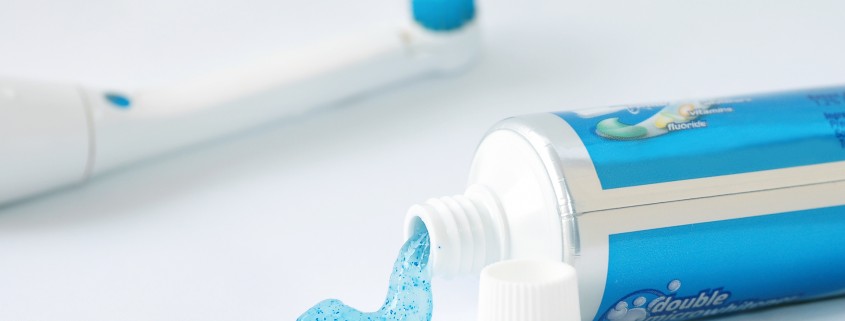Toothpaste | Justice Dental | Lexington, Kentucky Dentistry
A question every Lexington dentist is frequently asked: There are so many options at the store, what toothpaste should I buy? There is no one-size-fits-all answer, as one toothpaste consumer may need a product that helps with their teeth sensitivity and another may desire whiter teeth. But what are all these different types of toothpaste? Do you really need that many options? Do they even work? No matter what your mouth demands, we’re here to narrow down what all the different variety of toothpastes are for and to help shine some light on the toothpaste that is right for you. Remember: always talk to your Lexington dentist if you’re concerned about a specific type of toothpaste. Better safe than sorry!
What Does My Toothpaste Need to Do?
While not every consumer has sensitive teeth or is interested in brightening their smile, there are some features that every good toothpaste should have.
Combat Plaque and Tartar
No matter how well you care for your teeth, your mouth has bacteria that mixes with food, drinks, and whatever else you consume to form plaque. Plaque can lead to damaged tooth enamel and cavities, and if left unattended for long enough, plaque will harden into tartar which can harm your teeth and gums. Any good toothpaste should state that it has tartar-control with fluoride or includes an abrasive agent on its ingredient list that is capable of removing food, plaque and tartar causing bacteria, and stains. Two such abrasive agents are calcium carbonate and hydrated silica. In addition to brushing with toothpaste, floss and use an antiseptic mouthwash each day, so you can help kill bacteria and fight plaque in places where your toothbrush can’t reach.
Fluoride Toothpastes and Enamel Protection
As stated above, fluoride is useful for removing and preventing plaque and tartar, but it also has other uses. In addition to protecting your mouth from plaque, tartar, and eventual gum disease, fluoride can repair enamel damage that leads to tooth decay and cavities and protect you from future damage. Enamel is the thin outer layer of your teeth that protects your teeth from decay and hypersensitivity. Erosion of enamel is inevitable, and since your body can not repair enamel on its own, toothpaste with enamel protection is vital to the health of your teeth. While fluoride is often found in public drinking water and is typically most important to children who are between 6 months and 16 years of age, fluoride’s protective and reparative benefits make it a great addition to any toothpaste. In fact, fluoride is so important that a toothpaste must contain fluoride in order to receive an American Dental Association (ADA) Seal of Acceptance.
Don’t be so Sensitive
Many consumers are plagued by mild tooth and gum sensitivity, and toothpaste for sensitive teeth and gums is known to alleviate their pain. A toothpaste that says it treats sensitive teeth and gums should include either strontium chloride or potassium nitrate, which are two ingredients the ADA has found to be effective in the treatment of sensitivity. After four to six weeks of consistent use, these ingredients stop sensitivity by blocking the nerves in the mouth that cause you to feel the pain of sensitivity. In addition to using a toothpaste made for sensitive teeth and gums, be wary of any toothpaste that includes sodium lauryl sulfate, as it has been shown to irritate the gums and make sensitivity even more pronounced. If you are experiencing intense sensitivity or your sensitivity is caused by cavities or other tooth problems, see one of our caring, well-qualified dentists for further assistance.

big smile
To Whiten, or Not to Whiten
In the past few years, whitening toothpastes have flourished and companies have taken notice by putting more varieties of whitening toothpastes on the shelves. The problem is, over the counter whitening toothpastes are not as effective as many people think. The key ingredient in any whitening product is hydrogen peroxide, but the levels found in over the counter whitening toothpastes—around 1% to 1.5% hydrogen peroxide—are only high enough to rid your teeth of surface stains. So, if you are only interested in a slight improvement in the whiteness of your teeth, whitening toothpastes can be useful, but, generally, they aren’t necessary and fluoride is enough to combat slight surface stains. In order to whiten your teeth below the surface and achieve a brighter smile, ask one of our qualified dentists about our high potency whitening products, such as ZOOM! and KöR Whitening, which have between 10% and 35% hydrogen peroxide.
Remember…
Brushing with a quality toothpaste is only one aspect of a perfect smile. Flossing every day and having professional cleanings at least twice a year is key to having not only a beautiful smile, but a healthy smile. Your smile is as unique as you are, and we want to help you protect it.
We’re Not Your Average Lexington Dentist
From the moment you step into our office you’ll quickly realize that this isn’t your average Lexington dentist office. Our mission is to deliver the very best cosmetic and whole health, anti-aging dentistry by creating natural, beautiful and healthy smiles.
We promise to keep customer service and patient comfort as our top priority, all while delivering the very best treatments and procedures available today in any Lexington dentist – whether it’s delivering the perfect smile, reconstructing your whole mouth, or helping you identify or prevent whole health wellness.
We are world class, proudly nestled right here in Lexington, KY. From one of the top 25 dentists in the nation to handpicked teams of doctors, hygienists, surgeons and dental specialists – we create natural, beautiful, and healthy smiles which function with optimal comfort and durability.
Contact us today, and learn more about how we can help you design your perfect smile!





Leave a Reply
Want to join the discussion?Feel free to contribute!